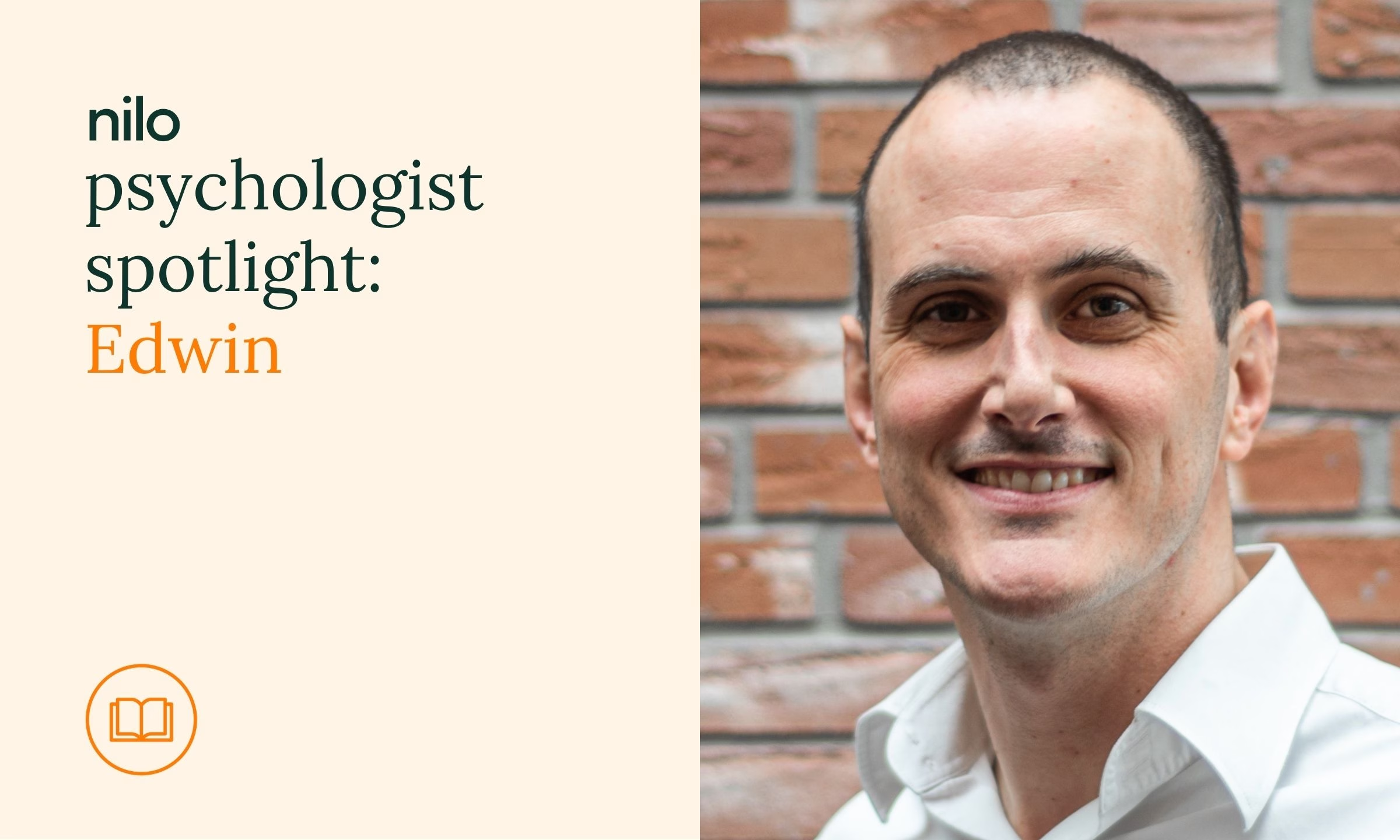A global team of leading psychologists makes up the heart of nilo.health’s platform, offering personalized, dedicated 1-to-1 counseling for every user. In our new series, we’re introducing them to you! Read on to discover more about nilo psychologist Edwin, his concerns with stigma around mental health at work, and his advice for workplace leaders.

Could you please introduce yourself?
My expertise in clinical psychology and healthcare management is underpinned by fifteen years of experience, my Master’s degree in Neuropsychology, qualification as a trained Healthcare (GZ) psychologist and my Executive MBA from the Rotterdam School of Management. I have worked with numerous people from all walks of life from the fringes to the upper class and all age groups, supporting their individual needs regardless of these backgrounds. I provide counseling in a broad range of topics ranging from clients facing depression and anxiety to coping with ADHD, Autism, anxiety or personality disorders.
Originally, I was drawn to neuropsychology, primarily out of a curiosity in the functioning of the human brain and consequential behavior, which is why I started out as a diagnostician. My focus was identifying what was functioning differently in someone’s brain and offering advice on how to adjust or cope with that. In subsequent years, I became more and more interested in actually acting on this advice and helping people understand what is going on in the brain and how a client can actively work on being less affected by it, or turning some perceived downsides into strengths.
It is unbelievable to me that there is no problem or embarrassment with having a high fever or breaking a leg for example, but with mental health issues there is.
Where are you based, and which languages do you speak?
I am Dutch, but I live in Copenhagen (Denmark) and speak four languages. I am fluent in both Dutch and English and provide therapy or counseling in those languages. I also speak Greek and Danish, enough to get myself through daily life and an occasional interesting discussion, yet not enough to actually offer therapy in those languages just yet.
How does the stigma around mental health in the workplace affect employees?
The stigma around mental health is a source of deep frustration for me, having seen the severe negative consequences on individuals and organizations. It is unbelievable to me that there is no problem or embarrassment with having a high fever or breaking a leg for example, but with mental health issues there is. In other words, it is not a problem when someone has a visible ailment, or an organ we understand is not functioning as it is supposed to. But when the most vital and irreplaceable organ in the body is malfunctioning, society (and consequently a lot of workplaces) dictates that this is a source of embarrassment.
When it comes to matters of the brain, we lose our patience rather quickly. We should provide the same support and understanding to mental health challenges as we do to the physical ones.
To illustrate this point imagine you break your leg, but there would be a stigma on broken legs. You try to hide your broken leg from public, you get to work and pretend to perform like every other day that your leg was not broken. If people ask you how you are doing, you smile and say you’re doing fine and you try to walk away from the coffee machine without limping (or crying out in pain). Instead of being able to do your job you spend your day keeping up a charade of being a productive colleague you cannot be at that time. Ridiculous, right? Your problem will get worse. Your leg is not only not healing; it is deteriorating.
Everyone understands this in the case with a broken limb, or with heart conditions, or kidney problems. Yet when it comes to matters of the brain, we lose our patience rather quickly. We should provide the same support and understanding to mental health challenges as we do to the physical ones. For the wellbeing of people, organizations and society.
What can be done to reduce this stigma?
Information, information, information. There is a Dutch saying that covers it in three words “onbekend maakt onbemind” which roughly translates into “unknown makes unloved” or in more words: We, as human beings, inherently dislike what we don’t understand. So, the only way out of this stigma is to make people understand. We all understand physical (for lack of a better word, because the brain is also physical) ailments. We all have them. We need to inform people on mental health issues and the consequences of it, because we all have these challenges too! Of course, this will be much easier if the leadership of a company is convinced of the need to reduce stigma and promote mental wellbeing. When leadership shows the way, it will be much easier to change how we view and deal with mental health issues.
In your opinion, how can integrating mental health support at work help an individual?
First of all, it will help break the stigma, opening the door for (early) interventions. By offering or integrating support, a company acknowledges the existence of mental health problems and recognizes the value of dealing with it as fast as possible. Again, like with a broken leg, the sooner you try to fix it, the better the chance of a satisfying outcome!
A psychologist or a coach is a tool really, a complex and diverse one, but a tool nonetheless. It is up to the client to use the tool.
And how can integrating mental health support at work help the larger company?
Mental health impacts from or at work are a key driver of lost productivity, and a hidden one at that. Because other than absence from work, which is measurable, presenteeism due to mental health issues are a hidden source of productivity loss, low engagement and a lack of creativity. There is strong evidence that supports these statements. The right mental health interventions would therefore not only directly address the personal consequences. They will benefit the company as a whole due to a boost in positive culture, creativity and consequently performance.
Could you tell us about a particular time (keeping it anonymous, of course!) that you’ve really seen your work with nilo help someone?
Well, first of all, and this is really going to sound cliché, but it is not my work that helps someone. A psychologist or a coach is a tool really, a complex and diverse one, but a tool nonetheless. It is up to the client to use the tool. Like a hammer cannot hammer down a nail by itself, and a carpenter can’t hammer a nail in wood with his bare hands. Most of the work comes from the client him/herself. Again, this may sound overly simplistic, but in its core it is true. Knowing your role as a psychologist, I feel, is the start of a good relationship and the relationship is key to the client’s success.
Having said that, I recently worked with a client who is the manager of a team in a company that is going through a rough time. He recognized that the pressure he experienced in these turbulent times made him take on more than he could handle, driven by a desire to protect his team and the uncertainty they all faced. Consequently, as he became increasingly stressed from the resulting overwhelming workload, he could not deliver the desired outcome. Worse still, his stressed behavior impacted his ability to lead the team and as a result the team’s performance was diminishing. What emerged was a classic vicious cycle of worsening individual and team performance.
Exploring in our sessions where his initial behavior and underlying desires were coming from and providing insight in this behavior, created an understanding and consequently an opening to changing behavior in an early stage. This focused approach enabled him to break the vicious cycle by involving the team’s combined strengths in dealing with the challenges and also trusting and delegating more. In the end this improved not only the team’s effectiveness, but also his own self confidence and mental wellbeing in a matter of weeks.
Be open to the concept of mental health, reframe mental health as a question of mental wellbeing where we all live on a continuum and will over our (professional) lives have good periods and bad.
What tips would you offer managers or leaders in a company to keep a healthy work environment that protects everyone’s mental health?
That is a very important question, easy to answer, difficult to execute. I would say: Be open to the concept of mental health, reframe mental health as a question of mental wellbeing where we all live on a continuum and will over our (professional) lives have good periods and bad. Recognizing this reality and acting on it helps the employee and the company. It is the cliché win-win.
But like I said, that is easy advice. It is not possible to shift attitudes overnight. So, alternatively, see it as a business case for your company or department. Every euro or dollar you spend on the mental health of your employees probably pays itself back a couple of times over. I would implore to business leaders, don’t take my word for it, make your own business case. Start to monitor mental health anonymously in your company, measure how your employees are doing, plan interventions and measure the effect of interventions. I’m pretty confident of the outcome.







